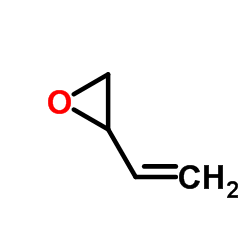2-Vinyloxirane

2-Vinyloxirane structure
|
Common Name | 2-Vinyloxirane | ||
|---|---|---|---|---|
| CAS Number | 930-22-3 | Molecular Weight | 70.090 | |
| Density | 1.1±0.1 g/cm3 | Boiling Point | 70.0±9.0 °C at 760 mmHg | |
| Molecular Formula | C4H6O | Melting Point | -135ºC | |
| MSDS | Chinese USA | Flash Point | -50.0±0.0 °C | |
| Symbol |


GHS02, GHS07 |
Signal Word | Danger | |
|
In vivo doses of butadiene epoxides as estimated from in vitro enzyme kinetics by using cob(I)alamin and measured hemoglobin adducts: an inter-species extrapolation approach.
Toxicol. Appl. Pharmacol. 281(3) , 276-84, (2014) 1,3-Butadiene (BD) is a rodent and human carcinogen. In the cancer tests, mice have been much more susceptible than rats with regard to BD-induced carcinogenicity. The species-differences are dependent on metabolic formation/disappearance of the genotoxic BD ... |
|
|
Mutagenicity of stereochemical configurations of 1,2-epoxybutene and 1,2:3,4-diepoxybutane in human lymphblastoid cells.
Chem. Biol. Interact. 166(1-3) , 207-18, (2007) The carcinogenicity of 1,3-butadiene (BD) is related to its bioactivation to several DNA-reactive metabolites; accumulating evidence suggests that the stereochemistry of these BD intermediates may play a significant role in the mutagenic and carcinogenic acti... |
|
|
Dose responses for DNA adduct formation in tissues of rats and mice exposed by inhalation to low concentrations of 1,3-[2,3-[(14)C]-butadiene.
Chem. Biol. Interact. 147(2) , 195-211, (2004) Male Sprague-Dawley rats and B6C3F1 mice were exposed to either a single 6h or a multiple (5) daily (6h) nose-only dose of 1,3-[2,3-(14)C]-butadiene at exposure concentrations of nominally 1, 5 or 20 ppm. The aim was to compare the results with those from a s... |
|
|
Identification of covalent modifications in P450 2E1 by 1,2-epoxy-3-butene in vitro.
Chem. Biol. Interact. 166(1-3) , 170-5, (2007) 1,3-Butadiene is metabolized mainly by cytochrome P450 2E1 to several epoxides that are considered toxic and carcinogenic. The first step of BD metabolism is oxidation to 1,2-epoxy-3-butene (EB), a reactive metabolite. It has been shown that P450s can be inac... |
|
|
Reactive metabolites of 1,3-butadiene: DNA and hemoglobin adduct formation and potential roles in carcinogenicity.
Adv. Exp. Med. Biol. 500 , 93-103, (2001)
|
|
|
A novel DNA adduct, originating from 1,2-epoxy-3,4-butanediol, is the major DNA adduct after exposure to [2,3-(14)C]-1,3-butadiene,[4-(14)C]-1,2-epoxy-3-butane.
Chem. Biol. Interact. 135-136 , 687-93, (2001) 1,3-Butadiene is a rodent carcinogen and its epoxide metabolites, 1,2-epoxy-3-butene (EB), 1,2-epoxy-3,4-butanediol (EBD), and 1,2:3,4-diepoxybutane (DEB) have been suggested as ultimate carcinogens. This study aimed at identification and quantification of DN... |
|
|
DNA adducts in rats and mice following exposure to [4-14C]-1,2-epoxy-3-butene and to [2,3-14C]-1,3-butadiene.
Chem. Biol. Interact. 148(1-2) , 69-92, (2004) 1,3-Butadiene (BD) is a major industrial chemical and a rodent carcinogen, with mice being much more susceptible than rats. Oxidative metabolism of BD, leading to the DNA-reactive epoxides 1,2-epoxy-3-butene (BMO), 1,2-epoxy-3,4-butanediol (EBD) and 1,2:3,4-d... |
|
|
Quantitative analysis of N-terminal valine peptide adducts specific for 1,2-epoxy-3-butene.
Chem. Biol. Interact. 166(1-3) , 219-25, (2007) Butadiene (BD) metabolism shows gender, species and concentration dependency, making the extrapolation of animal results to humans complex. BD is metabolized mainly by cytochrome P450 2E1 to three epoxides, 1,2-epoxy-3-butene (EB), 1,2;3,4-diepoxybutane (DEB)... |
|
|
3,4-Epoxy-1-butene, a reactive metabolite of 1,3-butadiene, induces somatic mutations in Xpc-null mice.
Environ. Mol. Mutagen. 47(1) , 67-70, (2006) Xpc-null (Xpc-/-) mice, deficient in the global genome repair subpathway of nucleotide excision repair (NER-GGR), were exposed by intraperitoneal (i.p.) injection to a 300 mg/kg mutagenic dose of 3,4-epoxy-1-butene (EB), to investigate NER's potential role in... |
|
|
Advances in the mass spectrometry of hemoglobin adducts: global analysis of the covalent binding of butadiene monoxide.
Chem. Biol. Interact. 135-136 , 667-74, (2001) A common method to assess exposure to 1,3-butadiene through both occupational and environmental routes involves the detection of hemoglobin adducts formed by the primary reactive metabolite butadiene monoxide (EB). This assay is a modification of the Edman de... |